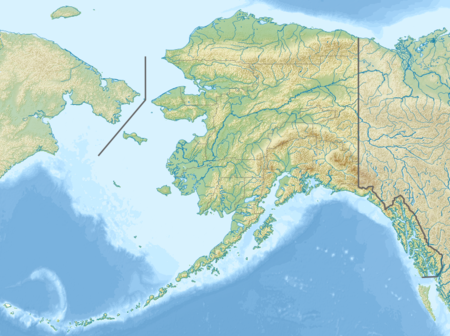Tlikakila River
| Tlikakila River | |
|---|---|
 Flowing through mountains | |
| Location | |
| Country | United States |
| State | Alaska |
| Borough | Kenai Peninsula, Lake and Peninsula |
| Physical characteristics | |
| Source | Summit Lake |
| • location | Lake Clark National Park, Aleutian Range, Kenai Peninsula Borough |
| • coordinates | 60°47′06″N 152°47′46″W / 60.78500°N 152.79611°W[1] |
| • elevation | 888 ft (271 m)[2] |
| Mouth | Little Clark Lake |
• location | 45 miles (72 km) northeast of Nondalton, Lake and Peninsula Borough |
• coordinates | 60°23′31″N 153°48′37″W / 60.39194°N 153.81028°W[1] |
• elevation | 253 ft (77 m)[1] |
| Length | 51 mi (82 km)[3] |
| Basin size | 622 sq mi (1,610 km2)[4] |
| Type | Wild |
| Designated | December 2, 1980 |
The Tlikakila River (Dena'ina Athabascan Łiq'a Qilanhtnu, literally "salmon-are-there river")[5] is a stream, 51 miles (82 km) long,[3] in the U.S. state of Alaska. The river, lying entirely within Lake Clark National Park, flows southwest from Summit Lake in the Chigmit Mountains of the Aleutian Range to Lake Clark.[6]
The Tlikakila is one of three national "wild rivers" in Lake Clark National Park.[3] The other two are the Mulchatna and the Chilikadrotna,[3] all added in 1980 to the National Wild and Scenic Rivers System.[7]
Boating
[edit]Varying from Class I (easy) to III (difficult) on the International Scale of River Difficulty, the Tlikakila River is floatable by raft and kayak. The Alaska River Guide describes it as suitable for "intermediate boaters with good wilderness skills".[4] To reach the floatable parts of the river from Summit Lake, boaters must make a 2-mile (3 km) portage.[3] Dangers include Class III rapids, which may require a second portage below the confluence with the North Fork Tlikakila River. Bears pose another danger, as does quicksand on the lower river.[4]
See also
[edit]References
[edit]- ^ a b c "Tlikakila River". Geographic Names Information System. United States Geological Survey. January 1, 2000. Retrieved November 28, 2013.
- ^ Derived by entering source coordinates in Google Earth.
- ^ a b c d e "Lake Clark National Preserve and Park: Rafting". National Park Service. Retrieved November 29, 2013.
- ^ a b c Jettmar, Karen (2008) [1993]. The Alaska River Guide: Canoeing, Kayaking, and Rafting in the Last Frontier (3rd ed.). Birmingham, Alabama: Menasha Ridge Press. pp. 189–90. ISBN 978-0-89732-957-6.
- ^ Bright, William. Native American Placenames of the United States. Norman: University of Oklahoma Press. p. 498. ISBN 0-8061-3576-X.
- ^ Alaska Atlas & Gazetteer (7th ed.). Yarmouth, Maine: DeLorme. 2010. pp. 67–68. ISBN 978-0-89933-289-5.
- ^ "Tlikalkila River, Alaska". National Wild and Scenic Rivers System. Retrieved November 29, 2013.
